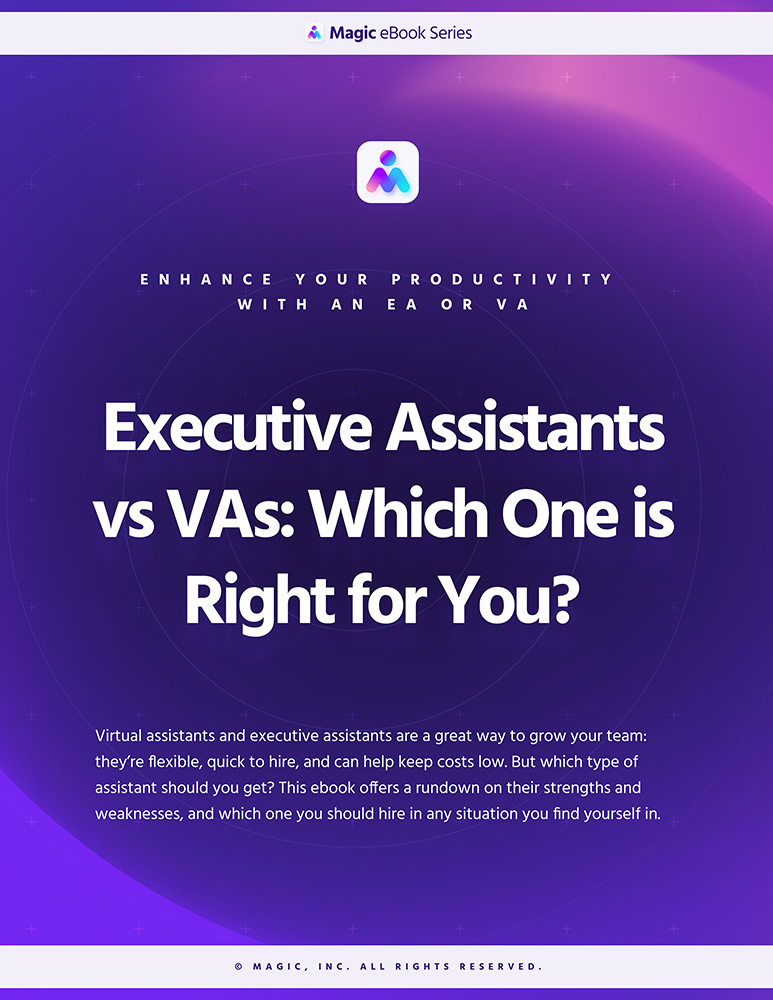For decades, executive assistants have been instrumental in the work of high-level executives. EAs have served as extensions of executives, enabling them to multiply the amount of work they can get done in the limited time they have each day.
Yet the image of executive assistant has lagged behind reality: many people still see EAs as receptionists or gophers—but contemporary executive assistant duties are much more complex.
EAs handle a whole host of responsibilities. The backbone of their work is still administrative or clerical in nature, but they also coordinate with other departments, manage projects, and solve various problems that crop up unexpectedly.
Many executives consider their EAs as their right hands, and with good reason. Furthermore, with the advances in remote collaboration technology, many virtual EAs can fulfill this role even from halfway around the world.
This article gives a rundown of the executive assistant role. First, we’ll run through the common tasks that everyone expects in an EA’s job description. After that, we’ll cover a few less common and more complicated tasks, which you might be surprised to learn that EAs often handle.
- Executive assistants provide high-level executive support to senior business leaders in a variety of different ways.
- The backbone of an EA’s work lies in time management and administrative duties. That said, they also do a lot of ad hoc problem-solving.
- A good EA multiplies the amount of work an executive can do in the limited time they have each day.
Understanding the Executive Assistant Role
An executive assistant provides high-level support to senior officers, such as C-suite executives and directors. It’s quite common for EAs to work one-to-one with their principals, though some support multiple executives either within the same company or across multiple businesses.
The executive assistant job scope is to amplify an executive’s productivity. They organize an executive’s time and take on some of their responsibilities, ensuring their boss’ office hours are spent as effectively as possible.
Since an EA costs significantly less to hire than an executive, this can vastly improve a company’s leadership performance without driving costs too far up.
Executive Assistant Job Scope
The executive assistant role is determined mainly by its objective: providing executives with support and ensuring they get more done within a limited time. Since their function is essentially to solve problems and provide executive support, they need to be able to approach things from multiple angles.
In practice, EAs end up performing a wide range of tasks in support of this goal. They often serve as coordinators, liaisons, researchers, writers, and more.
Common Executive Assistant Tasks
While you can’t pigeonhole an executive assistant’s work, a few things form the backbone of their duties. These are the tasks that EAs are most likely to attend to on a regular basis and the work they’re most widely known for.
Calendar Management
Managing time is at the core of an EA’s work. Unsurprisingly, then, calendar management is one of their fundamental duties. An EA can optimize an executive’s daily or weekly schedule, organizing blocks of time for optimal productivity.
Calendar management tasks include:
- Scheduling meetings
- Monitoring deadlines
- Sending reminders
- Coordinating schedules with other major counterparts or stakeholders
- Responding to invitations (declining them if they would pose too much of an interruption)
- Analyzing patterns to find out how to manage business tasks even more efficiently
Travel Planning and Coordination
Planning business trips can be a tedious or even vexing affair. This makes it one of the first things busy executives delegate to their assistants. Provided with the basic details of an upcoming trip, an EA can canvass options for transport, lodging, or even dining and recreation and then make the necessary arrangements once you’ve approved them.
Since a dedicated assistant gradually adapts to your habits and preferences, an EA will eventually figure out your preferences when it comes to traveling. This takes the stress out of your trips and out of the planning process.
Communication Handling
Another of an EA’s basic duties is serving as the initial point of contact for all of an executive’s correspondences. An EA takes phone calls, screens emails, relays messages, and liaises with internal and external parties alike. In this way, they guarantee that an executive receives urgent messages when needed but remains uninterrupted for less pressing matters.
Meeting Coordination
An EA can assist in preparing meetings to ensure they are a productive use of all attendees’ time. Among other things, they can:
- Identify common free times for attendees
- Reserve venues
- Send invitations
- Draft and/or disseminate the agenda
- Prepare presentation slides and/or speaker notes
- Take minutes and send follow-ups to attendees
Document Preparation
Drafting memos and reports is another task that EAs often handle. They can help at any stage, whether it’s compiling data, outlining and drafting, editing, or even formatting to match company branding.
EAs can also help manage documents, whether that means organizing them within your filing system or ensuring proper infosec measures are observed to keep sensitive information safe.

Hire an EA or VA to delegate more, stress less, and grow your business.
Learn More7 More Executive Assistant Duties
While they’re not as widely known for it, the executive assistant job scope also includes the following tasks.
Project Management and Coordination
It’s not uncommon for senior leaders to have multiple assistants. In these cases, EAs often take on the role of overseeing the office’s management. They assign tasks, ensure they’re performed to standards, and generally keep other office staff in line.
EAs can also serve as project managers. They can do progress checks and reports, move deadlines when necessary, and mobilize personnel or resources to clear roadblocks.
Research and Market Analysis
A lot of EAs have a background in business administration, finance, or related fields. Seasoned EAs, moreover, are likely to have firsthand experience solving problems and leveraging trends in their clients’ industry. Put this together, and you have an assistant who knows enough about business to help you answer questions about it.
For this reason, EAs also tend to help out with research and analysis. Executive assistants can assist in research, from analyzing studies or raw data to drafting or reviewing reports. An experienced EA can provide a valuable second opinion when analyzing new information.
Crisis Management and Problem Solving
Since executives typically focus on ensuring a business’ long-term plans are chugging along, it typically falls to EAs to put out smaller fires, as it were. Moreso than administrative assistants, EAs need to be resourceful and quick-witted. This allows them to deal with problems and crises as they arise without having to disrupt an executive’s work.
A dedicated assistant, who’s familiar with how their boss works, who they can call on for help, and what pitfalls to avoid, can be especially effective in this role.
Event Planning and Coordination
Event planning can be a nightmare, with a dozen and one things to juggle at any given moment. EAs often take the reins in these cases, serving as a coordinator for the various parties involved.
It allows business leaders to focus on the big picture—the objectives of the event, for instance, or the relationships it’s meant to foster—while EAs direct other staff members in the gritty, on-the-ground details.
In practical terms, an EA can:
- Contact resource persons or specialists
- Reserve venues and arrange logistics
- Send invitations and manage the guest list
- Canvass providers
- Draft and monitor the event budget
- Troubleshoot problems along the way
Online Presence Management
Online activities, such as email and social media, have become inextricable from the “face-to-face” aspect of business. But that doesn’t mean they’ve become any easier. If anything, current algorithmic web platforms tend to prioritize constant activity and updates.
An EA can ensure an active, updated online presence that bolsters their client’s professional networking efforts. They can also attend to basic online interactions, such as brief but courteous replies, community interactions, and greetings on important days or events.
Financial Management and Budgeting
Another duty an EA can take on is tracking and managing an officer’s budget. They can do this for:
- Projects their client is in charge of (especially if the project team has no bookkeeper)
- An officer’s discretionary or representation budget
- The office’s operational budget
- They can also handle any bookkeeping and data entry tasks that go along with that sort of work.
Legal and Compliance Oversight
Preparing submissions for taxes or other industry regulations can take up a lot of time—often resulting in seasonal backlogs or crunch periods.
An EA can maintain relevant records year-round and compile supporting documents when submission periods approach. This way, the concerned departments (or the business as a whole) can avoid getting bogged down in last-minute preparations.
Elevate Your Executive Support with Magic
Executive assistants have long been the secret weapons of the world’s best business leaders. Skilled assistants with the right resources can boost an executive’s productivity many times over.
Magic specializes in helping business leaders get skilled virtual assistants. We screen thousands of assistants each year to find candidates with the skills to maximize their clients’ leadership potential.
Furthermore, our services are designed to be quick, flexible, and straightforward. Simply tell us what sort of help you need, and we’ll find the right assistant for you. Schedule a call today!









